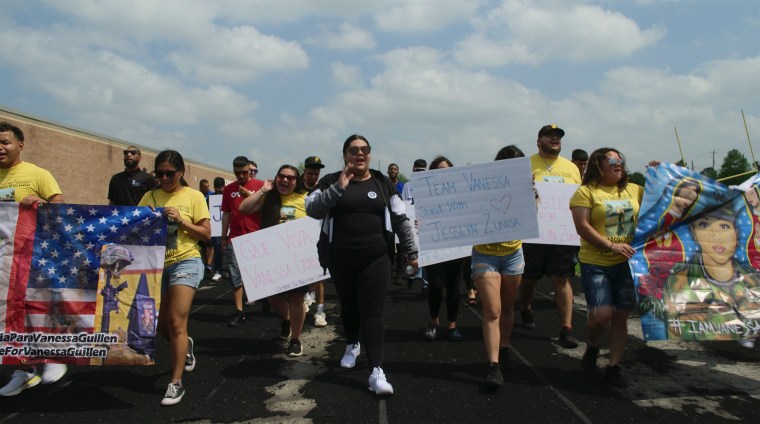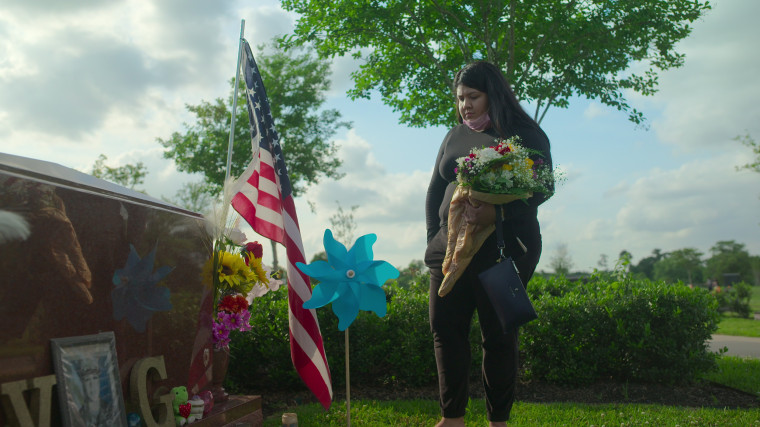A new documentary about the killing of Mexican American soldier Vanessa Guillen provides an inside look at the tenacious pursuit her family embarked to spark change in the military justice system.
Christy Wegener, director of the “I am Vanessa Guillen” documentary available on Netflix Thursday, said this is “not a traditional crime documentary by any means.”
“It has a bigger mission,” she told NBC News. “We focused on the fact that this family was going through one of the hardest periods of their life, and they turned it into a movement to help the greater good.”
The documentary starts with the Guillens facing an unclear path to justice for the slain soldier, in part because the military justice system relies on commanders exercising discretion in deciding whether an offense should be charged and how the offenders should be punished — a structure that the family and their advocates felt contributed to delivering few answers and did little to hold anyone accountable.
Vanessa disappeared from the Fort Hood military base in Texas on April 22, 2020. Advocates and family members quickly organized rallies outside the base and launched a #FindVanessaGuillen hashtag social media campaign.
More than two months later, the calls to #FindVanessaGuillen turned into demands for #JusticeForVanessaGuillen after her dismembered remains were found near the base. A soldier at the base shot and killed himself when police moved in to arrest him in connection with Guillen’s disappearance and death, according to authorities.
The Guillens said Vanessa had told relatives and colleagues at Fort Hood, which has some of the highest rates of murder, sexual assault and harassment in the Army, that she had been sexually harassed.
Guillen's allegations, which were later confirmed by an Army investigation, prompted countless service members to share their experiences with sexual assault and harassment on social media using the #IAmVanessaGuillen hashtag.
Throughout their journey, it became clear that the only impactful way the Guillens had to get some justice was by convincing Congress to introduce a new law named after Vanessa to move prosecution authority outside the chain of command for certain offenses.
“It was hard to accept in the beginning because you think justice means people are being held accountable, they go to jail and they serve their time,” Mayra Guillen, Vanessa’s oldest sister, told NBC News. “This was completely different.”
'They moved a mountain'
The movement helped trigger some changes. It resulted in the removal of 14 Fort Hood leaders from their positions and prompted several military policy reforms, including revisions to the Army’s sexual harassment and prevention program and to the "missing soldier" protocols, among other changes.
Key parts of the I Am Vanessa Guillen Act became law in December 2021, including criminalizing sexual harassment under the Uniform Code of Military Justice, improving how certain officials respond to sex-related offenses through independent investigations, and removing the decision to prosecute sexual misconduct cases from service members’ chains of command.
"It's been a hard two years, but I am proud to see what we've accomplished in her honor and how we found a way to raise her voice and make something positive out of a huge tragedy," Mayra Guillen said.

The changes highlight how a Mexican American family’s push for answers is sparking meaningful change to the military at a time when increasingly more people of color and women are enlisting in the armed forces.
Vanessa’s case particularly resonated with Latino communities nationwide as they have become the fastest growing minority population in the military, according to the Pew Research Center.
"This is historic and they moved a mountain," Wegener said about what the Guillens and their attorney were able to accomplish. "But this is a big problem that you can't solve with one bill."
Continuing the fight
This is top of mind for Mayra Guillen, who was in Washington, D.C. Tuesday working to legalize the remaining parts of the original I Am Vanessa Guillen Act, the one main thing being allowing sexual trauma "victims to file claim and be compensated for the negligence of the military," she said.
As her fight for further and more permanent military reform continues, Mayra Guillen said she has considered becoming a congresswoman.
“If the time is right, and things just fall in place, I do see myself running for office hopefully in the near future,” she said. "I hate the way that things happened and how I ended up here in the first place, but I've learned so much over the last two years, and I'm sure we'll continue to learn so much more."

"If I was able to help being just an ordinary person, a civilian," she continued, "then I can really imagine the things that I would be able to do for the community and for many more people with within Congress."
In the meantime, the Guillen family is working on creating a foundation in Vanessa's name to provide support to other sexual trauma survivors in the military.
The hope is to be ready to start helping families sometime next year and later expand into helping families facing different issues within the military.
"It's a shame that these things keep happening, and civilians are the ones that have to find a solution," Mayra Guillen said.
The Guillens sued the U.S. Department of Defense in August seeking $35 million in damages for Vanessa's wrongful death. The department now has three months left to respond, either by reaching a settlement or taking the case to a jury trial.

